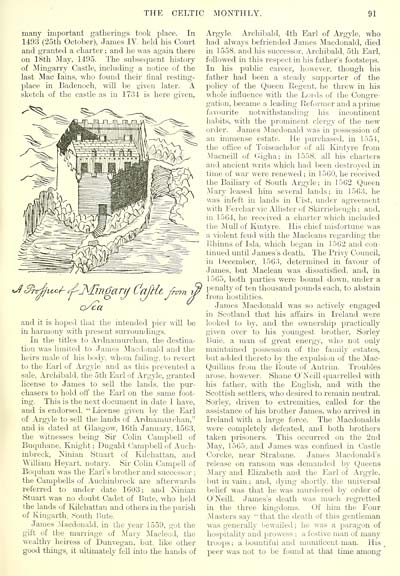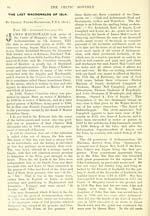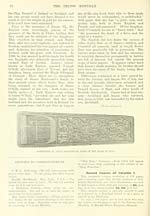Blair Collection > Celtic monthly > Volume 2, 1894
(111)
Download files
Complete book:
Individual page:
Thumbnail gallery: Grid view | List view

THE CELTIC MONTHLY.
91
many important gatherings took place. In
1493 (25th October), James IV. held his Com-t
and granted a charter ; and he was again there
on 18th ALav, 1495. The subsequent history
of jSIingarry Castle, iucluduig a notice of the
last Mac lains, who found their tinal resting-
place in Badenoch, will be t;iven later. A
sketch of the castle as in 1734 is here given,
o/ca
and it is hoped that the intended jjier will be
in harmony with present surroundings.
In the titles to Ardnamurchau, the destina-
tion was limited to James Macdunald and the
heirs male of his bodj', whom failiug. to revert
tu the Earl of Argyle and as this prevented a
sale, Archibald, the 5th Earl of Argyle, granted
license to James to sell the lauds, the pur-
chasers to hold oif the Eai'l on the same foot-
ing. This is the next dociunent in date I have,
and is endorsed, " License given by the Earl
of Ai-gyle to sell the lands of Ardnamurchan,"
and is dated at Glasgow, 16th January, 15G3,
the witnesses being Sir Colin Camijbell of
Buquhane, Knight ; Dugald Campbell of Auch-
inbreck, Niuian Stuart of KUchattan, and
William Heyart, notary. Sir Colui Camjjell of
Boquhan was the Earl's brother and successor ;
the Campbells of Auchinbreck are afterwards
referred to under date 1603 ; and Niuian
Stuart was no doubt Cadet of Bute, who held
the lands of Ivilchattan and others in the parish
of Kiiigarth, South Liute.
James -Macdonald. in the year 1559, got the
gift of the marriage of Mary Macleod, the
wealthy heiress of Dunvegau, but, like other
good things, it ultimately fell into the hands of
Argyle, Archibald, 4th Earl of Argyle, who
had always befriended James Macdonald, died
in 1558, and his successor, Archibald, 5th Earl,
followed in this respect ui his father's footsteps.
In his pubhc career, however, though his
father had been a steady supporter of the
policy of the Queen Regent, he threw in his
whole mfluence with the Lords of the Congre-
gation, became a leading Reformer and a prune
fiivourite notwithstanding his incontinent
habits, with the prominent clergy of the new
order. James Macdonald was in possession of
an immense estate. He jiurchased, in loS-t,
the office of Toiseachdor of all Kiutyre from
-Macneill of Gigha; in 1558, all his charters
and ancient writs which had been destroyed in
time of war were renewed; in 1560, he received
the Bailiary of South Argyle; in 1562 Queen
Mary leased him several lands; in 1563, he
was infeft iu lands in Uist, under agreement
with Ferchar-vic Allister of Skirrieheugh ; and,
in 1564, he received a charter which included
the Mull t>f Kintyre, His chief misfortune was
a violent feud with the ^Macleans regarding the
Rhinus of Isla, which began in 1562 and con-
tinued until James's death. The Privy Council,
iu December, 1563, determined in favour of
James, but Maclean was dissatisfied, and, iu
1565, both parties were bound down, imder a
penalty of ten thousand poiuids each, to abstain
from hostihties.
James JNIacdonald was so actively engaged
in Scotland that his affairs iu Ireland were
looked to by, and the ownership practically
given over to his j'ouugest brother, Sorley
Buie, a man of great energy, who not only
maintained po.ssessiou of the family estates,
liiit added thereto by the e.xpulsiuu of the Mac-
Qiiillins from the Route of Antrim. Troubles
arose, however. Shane O'Neill c[uarrelled with
his father, with the English, and with the
Scottish settlers, who desired to remain neutral.
Sorley, driven to extremities, called for the
assistance of his brother James, who arrived La
Ireland with a lai'ge force. The Macdonalds
were completely defeated, and both brothers
taken prisoners. This occurred on the 2nd
May, 1565, and James was confined in Castle
Corcke, near Strabane. James Macdonald's
release on ransom was demanded by Queens
Mary and Elizabeth and the Earl of Argyle,
but in vain ; and, dj'ing shortly, the universal
belief was that he was murdered by order of
O'Neill. James's death was much regretted
in the thi-ee kingdoms. Of him the Four
^Masters say "that the death of this gentleman
was generally Ijewailetl ; he was a pai'agon of
hospitality and prowess ; a festive man of many
troops ; a bountiful and mumticent man. His
peer was not to be found at that time among
91
many important gatherings took place. In
1493 (25th October), James IV. held his Com-t
and granted a charter ; and he was again there
on 18th ALav, 1495. The subsequent history
of jSIingarry Castle, iucluduig a notice of the
last Mac lains, who found their tinal resting-
place in Badenoch, will be t;iven later. A
sketch of the castle as in 1734 is here given,
o/ca
and it is hoped that the intended jjier will be
in harmony with present surroundings.
In the titles to Ardnamurchau, the destina-
tion was limited to James Macdunald and the
heirs male of his bodj', whom failiug. to revert
tu the Earl of Argyle and as this prevented a
sale, Archibald, the 5th Earl of Argyle, granted
license to James to sell the lauds, the pur-
chasers to hold oif the Eai'l on the same foot-
ing. This is the next dociunent in date I have,
and is endorsed, " License given by the Earl
of Ai-gyle to sell the lands of Ardnamurchan,"
and is dated at Glasgow, 16th January, 15G3,
the witnesses being Sir Colin Camijbell of
Buquhane, Knight ; Dugald Campbell of Auch-
inbreck, Niuian Stuart of KUchattan, and
William Heyart, notary. Sir Colui Camjjell of
Boquhan was the Earl's brother and successor ;
the Campbells of Auchinbreck are afterwards
referred to under date 1603 ; and Niuian
Stuart was no doubt Cadet of Bute, who held
the lands of Ivilchattan and others in the parish
of Kiiigarth, South Liute.
James -Macdonald. in the year 1559, got the
gift of the marriage of Mary Macleod, the
wealthy heiress of Dunvegau, but, like other
good things, it ultimately fell into the hands of
Argyle, Archibald, 4th Earl of Argyle, who
had always befriended James Macdonald, died
in 1558, and his successor, Archibald, 5th Earl,
followed in this respect ui his father's footsteps.
In his pubhc career, however, though his
father had been a steady supporter of the
policy of the Queen Regent, he threw in his
whole mfluence with the Lords of the Congre-
gation, became a leading Reformer and a prune
fiivourite notwithstanding his incontinent
habits, with the prominent clergy of the new
order. James Macdonald was in possession of
an immense estate. He jiurchased, in loS-t,
the office of Toiseachdor of all Kiutyre from
-Macneill of Gigha; in 1558, all his charters
and ancient writs which had been destroyed in
time of war were renewed; in 1560, he received
the Bailiary of South Argyle; in 1562 Queen
Mary leased him several lands; in 1563, he
was infeft iu lands in Uist, under agreement
with Ferchar-vic Allister of Skirrieheugh ; and,
in 1564, he received a charter which included
the Mull t>f Kintyre, His chief misfortune was
a violent feud with the ^Macleans regarding the
Rhinus of Isla, which began in 1562 and con-
tinued until James's death. The Privy Council,
iu December, 1563, determined in favour of
James, but Maclean was dissatisfied, and, iu
1565, both parties were bound down, imder a
penalty of ten thousand poiuids each, to abstain
from hostihties.
James JNIacdonald was so actively engaged
in Scotland that his affairs iu Ireland were
looked to by, and the ownership practically
given over to his j'ouugest brother, Sorley
Buie, a man of great energy, who not only
maintained po.ssessiou of the family estates,
liiit added thereto by the e.xpulsiuu of the Mac-
Qiiillins from the Route of Antrim. Troubles
arose, however. Shane O'Neill c[uarrelled with
his father, with the English, and with the
Scottish settlers, who desired to remain neutral.
Sorley, driven to extremities, called for the
assistance of his brother James, who arrived La
Ireland with a lai'ge force. The Macdonalds
were completely defeated, and both brothers
taken prisoners. This occurred on the 2nd
May, 1565, and James was confined in Castle
Corcke, near Strabane. James Macdonald's
release on ransom was demanded by Queens
Mary and Elizabeth and the Earl of Argyle,
but in vain ; and, dj'ing shortly, the universal
belief was that he was murdered by order of
O'Neill. James's death was much regretted
in the thi-ee kingdoms. Of him the Four
^Masters say "that the death of this gentleman
was generally Ijewailetl ; he was a pai'agon of
hospitality and prowess ; a festive man of many
troops ; a bountiful and mumticent man. His
peer was not to be found at that time among
Set display mode to: Large image | Transcription
Images and transcriptions on this page, including medium image downloads, may be used under the Creative Commons Attribution 4.0 International Licence unless otherwise stated. ![]()
| Early Gaelic Book Collections > Blair Collection > Celtic monthly > Volume 2, 1894 > (111) |
|---|
| Permanent URL | https://digital.nls.uk/75845121 |
|---|
| Shelfmark | Blair.55 |
|---|---|
| Additional NLS resources: | |
| Attribution and copyright: |
|
| Description | A selection of books from a collection of more than 500 titles, mostly on religious and literary topics. Also includes some material dealing with other Celtic languages and societies. Collection created towards the end of the 19th century by Lady Evelyn Stewart Murray. |
|---|
| Description | Selected items from five 'Special and Named Printed Collections'. Includes books in Gaelic and other Celtic languages, works about the Gaels, their languages, literature, culture and history. |
|---|

